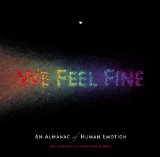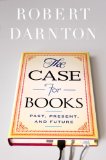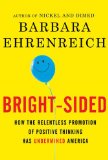December 5, 2009

We Feel Fine: An Almanac of Human Emotion by Sep Kamvar and Jonathan Harris (Scribner, 2009)
(link for UK)
Product description from the publisher:
In this dazzling exploration of contemporary human feelings, digital whiz kids Sep Kamvar and Jonathan Harris use their computer programs to peer into the inner lives of millions, constructing a vast and deep portrait of our collective emotional landscape. Armed with custom software that scours the English-speaking world’s new Internet blog posts every minute, hunting down the phrases “I feel” and “I am feeling,” the authors have collected over 12 million feelings since 2005, amassing an ever-growing database of human emotion that adds more than 10,000 new feelings a day. Drawing from this massive real-world stockpile of found sentiment, We Feel Fine: An Almanac of Human Emotion presents the best of the best — the euphoria, the despair, the passion, the dreams, and the desires that make us human. At turns touching and thought-provoking, humorous and heartbreaking, We Feel Fine combines the words and pictures of total strangers to explore every corner of the human experience. Packed with personal photos, scientific observations, statistical infographics, and countless candid vignettes from ordinary people, We Feel Fine is a visual, fiercely intelligent, endlessly engrossing crash course in the secrets of human emotion. Are men or women happier? Does rainy weather affect how we feel? Is beauty the bridge between happiness and negativity? How do our emotions change as we age? What causes depression? What’s sexy? What’s normal? What’s human? We Feel Fine finally provides a way to answer these questions that is both quantitative and anecdotal, putting individual stories into a larger context and showing the stories behind the statistics — or as the authors like to say, “bringing life to statistics and statistics to life.” With lush, colorful spreads devoted to 50 feelings, 13 cities, 10 topics, 6 holidays,5 age groups, 4 weather conditions, and 2 genders, We Feel Fine explores our emotions from every angle, providing insights into and examples of each. Equal parts pop culture and psychology, computer science and conceptual art, sociology and storytelling, We Feel Fine is no ordinary book — with thousands of authors from all over the world sharing their uncensored emotions, it is a radical experiment in mass authorship, merging the online and offline worlds to create an indispensable handbook for anyone interested in what it’s like to be human.
The whole book (and more) can be viewed at the website.
Comments (0)
- culture,mind,new books
November 11, 2009

The Faith Instinct: How Religion Evolved and Why It Endures by Nicholas Wade is a preorder as I’m writing but due out from Penguin tomorrow (Nov 12) so it may be available by the time you’re reading this.
(link for UK)
Product description from the author’s website:
The Faith Instinct presents a novel approach to religion. It explores the evolutionary origins of religious behavior in early humans, and traces the cultural development of religion from its origins up until to the present day.
The book does not challenge the central belief of either atheists or people of faith, since it offers no opinion as to whether or not God exists. It’s about religious behavior and its value to the first human societies and their successors.
Based on evidence from anthropologists’ studies of religion, and new findings from genetics and archaeology, The Faith Instinct concludes that religious behavior was favored by natural selection because of the survival advantage it conferred on early human groups.
The religion of early peoples, who lived as hunters and gatherers, underwent a profound cultural transformation as the hunter gatherers formed the first settled societies. The form of religious observance shifted from all-night communal dances, to the spring and harvest festivals of early agricultural societies, to the forms of religion more familiar today. The Faith Instinct retraces the historical context in which Judaism, Christianity and Islam arose, and analyzes how religion has retained many of its ancient roles even in modern secular societies.
An excerpt, reviews and more are available at the author’s website.
Comments (0)
- culture,new books
October 20, 2009

The Case for Books: Past, Present, and Future by historian Robert Darnton (PublicAffairs, 2009).
(link for UK)
Product description from the publisher:
The invention of writing was one of the most important technological, cultural, and sociological breakthroughs in human history. With the printed book, information and ideas could disseminate more widely and effectively than ever before—and in some cases, affect and redirect the sway of history. Today, nearly one million books are published each year. But is the era of the book as we know it—a codex of bound pages—coming to an end? And if it is, should we celebrate its demise and the creation of a democratic digital future, or mourn an irreplaceable loss? The digital age is revolutionizing the information landscape. Already, more books have been scanned and digitized than were housed in the great library in Alexandria, making available millions of texts for a curious reader at the click of a button, and electronic book sales are growing exponentially. Will this revolution in the delivery of information and entertainment make for more transparent and far-reaching dissemination or create a monopolistic stranglehold?
In The Case for Books, Robert Darnton, an intellectual pioneer in the field of the history of the book and director of Harvard University’s Library, offers an in-depth examination of the book from its earliest beginnings to its shifting role today in popular culture, commerce, and the academy. As an author, editorial advisor, and publishing entrepreneur, Darnton is a unique authority on the life and role of the book in society. This book is a wise work of scholarship—one that requires readers to carefully consider how the digital revolution will broadly affect the marketplace of ideas.
See also:
More new releases in Books & Reading
Barnes & Noble’s upcoming ebook reader
Comments (0)
- culture,new books,reading
October 16, 2009

Religious Experience Reconsidered: A Building-Block Approach to the Study of Religion and Other Special Things by Ann Taves (Princeton University Press, 2009)
(link for UK)
Product description from the publisher:
The essence of religion was once widely thought to be a unique form of experience that could not be explained in neurological, psychological, or sociological terms. In recent decades scholars have questioned the privileging of the idea of religious experience in the study of religion, an approach that effectively isolated the study of religion from the social and natural sciences. Religious Experience Reconsidered lays out a framework for research into religious phenomena that reclaims experience as a central concept while bridging the divide between religious studies and the sciences.
Ann Taves shifts the focus from “religious experience,” conceived as a fixed and stable thing, to an examination of the processes by which people attribute meaning to their experiences. She proposes a new approach that unites the study of religion with fields as diverse as neuroscience, anthropology, sociology, and psychology to better understand how these processes are incorporated into the broader cultural formations we think of as religious or spiritual. Taves addresses a series of key questions: how can we set up studies without obscuring contestations over meaning and value? What is the relationship between experience and consciousness? How can research into consciousness help us access and interpret the experiences of others? Why do people individually or collectively explain their experiences in religious terms? How can we set up studies that allow us to compare experiences across times and cultures?
Religious Experience Reconsidered demonstrates how methods from the sciences can be combined with those from the humanities to advance a naturalistic understanding of the experiences that people deem religious.
Comments (0)
- consciousness,culture,new books
October 13, 2009

Bright-sided: How the Relentless Promotion of Positive Thinking Has Undermined America by Barbara Ehrenreich (Metropolitan Books, 2009)
(link for UK)
Product description from the publisher:
A sharp-witted knockdown of America’s love affair with positive thinking and an urgent call for a new commitment to realism
Americans are a “positive” people—cheerful, optimistic, and upbeat: this is our reputation as well as our self-image. But more than a temperament, being positive, we are told, is the key to success and prosperity.
In this utterly original take on the American frame of mind, Barbara Ehrenreich traces the strange career of our sunny outlook from its origins as a marginal nineteenth-century healing technique to its enshrinement as a dominant, almost mandatory, cultural attitude. Evangelical mega-churches preach the good news that you only have to want something to get it, because God wants to “prosper” you. The medical profession prescribes positive thinking for its presumed health benefits. Academia has made room for new departments of “positive psychology” and the “science of happiness.” Nowhere, though, has bright-siding taken firmer root than within the business community, where, as Ehrenreich shows, the refusal even to consider negative outcomes—like mortgage defaults—contributed directly to the current economic crisis.
With the mythbusting powers for which she is acclaimed, Ehrenreich exposes the downside of America’s penchant for positive thinking: On a personal level, it leads to self-blame and a morbid preoccupation with stamping out “negative” thoughts. On a national level, it’s brought us an era of irrational optimism resulting in disaster. This is Ehrenreich at her provocative best—poking holes in conventional wisdom and faux science, and ending with a call for existential clarity and courage.
See also: Author’s website
Update 10/16 – Barbara Ehrenreich on the Daily Show:
Comments (0)
- culture,happiness,new books







